by John Eichberger (Transportation Energy Institute) Recently, I have seen several reports claiming that biofuels are not good for the environment, that they emit more carbon than the petroleum they displace and that their production has diverted resources and negatively affected food supplies and prices. Such reports concern me because they directly contradict several peer-reviewed reports published by the Transportation Energy Institute in recent years, such as “Decarbonizing Combustion Vehicles” and “Balancing the Benefits of Biofuels.” I don’t want to get into a petty point-by-point comparison of our research and these other studies, because I really don’t think that is necessary for this article. Let’s just say, I trust the TEI process and believe in the results of our research.
Why I Trust TEI Research
Let me explain why I have so much confidence in the results of our research. I am a strong believer in facts and subjecting analysis to the review of people with diverse perspectives. The TEI research process is anchored on these principles and is why so many companies rely on our research for business intelligence.
Our Board of Advisors is comprised of more than 60 individuals representing the entire value chain in transportation energy, sort of a “Team of Rivals” if you will, a collection of industry experts with diverse and often conflicting perspectives and objectives. Our research is designed to answer questions, not support an advocacy agenda, and our peer review process gives each Board member the opportunity to review and weigh in on the research before it is published to ensure it is based on documented facts and is void of bias. Every report we have published has been done without objection from anyone on this Board.
I am supremely confident that if there was something in our reports that was slanted either for or against biofuels, or based upon some disreputable data, someone would cry foul, and we would have the opportunity to correct the error. When I see headlines that strongly contradict what our reports find, I wonder if the studies they reference were subject to similar peer review to ensure their approach and conclusions are balanced and objective, or if they were written to support a pre-determined perspective.
So, let’s take a look at three reports we have published in the past couple of years and see what they found regarding the environmental and economic impacts of biofuels.
Effectiveness of Emissions Reductions
The Board took a significant look at biofuels and their role in reducing emissions with a white paper in 2022, “Assessment of Biofuels Policy – Effectiveness of Emissions Reductions.” This paper, written by Stratas Advisors, found that biofuels had already helped to significantly reduce GHG emissions in the U.S. transportation sector and that biofuels, especially ethanol, represent “one of the most practical solutions to lowering U.S. transportation emissions in the near-term.” The following chart shows the carbon intensity values (CI), which measures grams of CO2 equivalent per megajoule of energy provided (gCO2e/MJ), for a variety of fuel options based upon a model used in California and one used in Germany. This is an important comparison because California takes into consideration indirect land use changes (ILUC) in its model whereas Germany does not. How ILUC is addressed in a model can often help explain some disparity in findings, yet in the comparison presented in the figure biofuels across the board are delivering a carbon benefit relative to the fuel they are displacing.
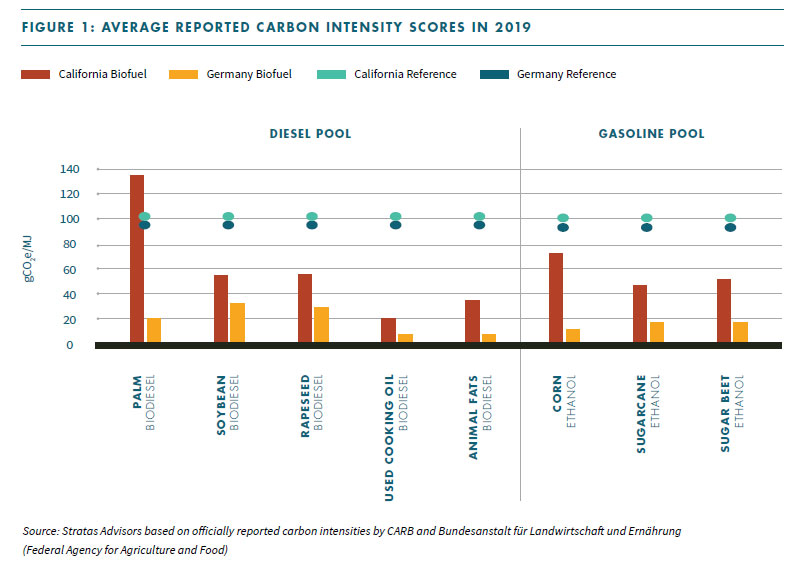
Decarbonizing Combustion Engines
The Board of Advisors recognized that the global objectives of reducing carbon emissions from transportation could not be met by waiting for 1.5 billion vehicles around the world to be replaced by new technology enabled vehicles, like battery electric and fuel cell electric vehicles. To succeed, it is essential to reduce emissions from internal combustion engine (ICE) vehicles as well. The Board commissioned Stillwater Associates to study the issue and in 2023 TEI published, “Decarbonizing Combustion Vehicles: A Portfolio Approach to GHG Emissions.” This study evaluated the options to reduce emissions through the life cycle of an ICE vehicle and the liquid fuels they consume. A key finding was that biofuels can contribute significantly to reducing transportation emissions. Here are some of the key findings in that study:
- Lower Carbon Intensity – The report presented a table of CI values for a variety of fuel options as calculated in Argonne National Laboratory’s GREET Model in 2022. That table demonstrates that biofuels, on a life cycle basis, have a CI that is 40% – 60% lower than the petroleum product it displaces.
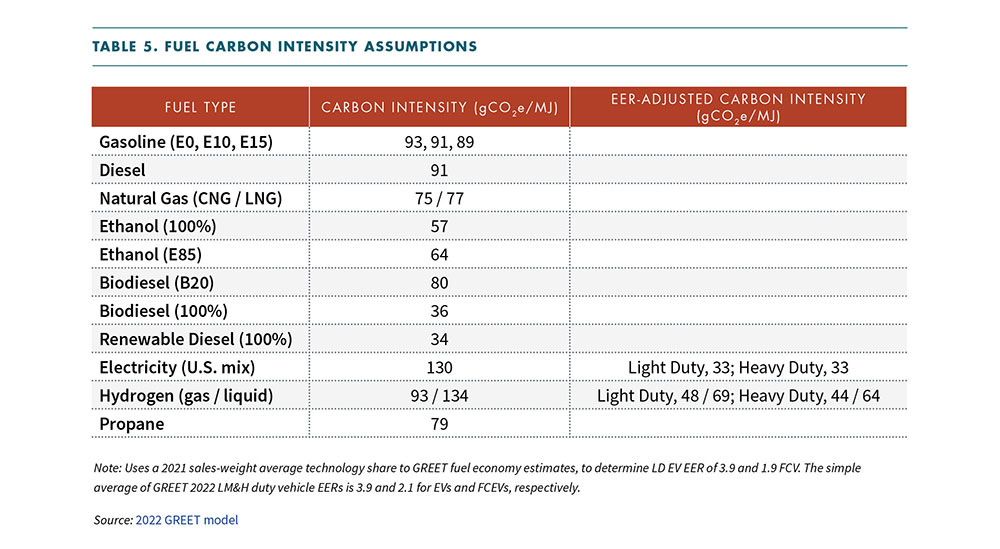
- Low CI Compounded in a Large Fleet – When this lower CI value is taken into account along with the slow pace of fleet turnover in the U.S., biofuels were projected to account for more than 75% of cumulative greenhouse gas (GHG) emissions reductions through 2050. In the absence of biofuels, these GHG emissions would continue unabated.

- Real-World Evidence – Under California’s Low Carbon Fuel Standard (LCFS), biofuels have proven their value in reducing carbon emissions. From 2011to 2022, biofueled ICEVs had reduced 76 million metric tons (MT) of GHG emissions in California, accounting for 83% of California’s cumulative mobile source GHG reductions.
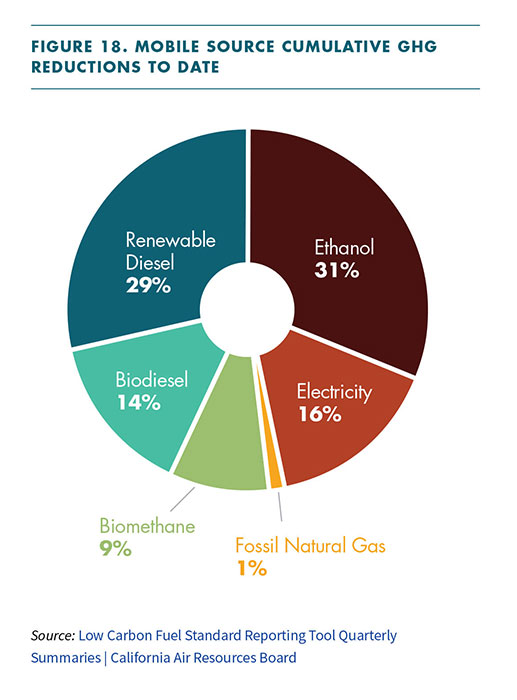
Balancing the Benefits of Biofuels
Following publication of “Decarbonizing Combustion Engines” and the evidence it presented regarding the environmental benefits of biofuels, the TEI Board of Advisors initiated work on a study to provide a fact-based assessment on the real impact of biofuels on the economy. The Board wanted to better understand what costs were associated with these emissions benefits and explore if there was any merit to the argument against using food commodities to produce fuel. The Board went back to Stillwater Associates to answer these questions and in 2024 the Institute published “Balancing the Benefits of Biofuels: The Economics of U.S. Crop-Based Fuel Production.” This study contradicts a lot of what has recently been put out there by other organizations and demonstrates the economic and agricultural value of biofuels production.
- Land Used for Biofuels Production – Some have argued that increased reliance on biofuels requires allocation of more land mass to produce the feedstock and that this land could be better used for other purposes. Yet this is not supported by the data. Since 2011, the gross acreage required for biofuel feedstocks has been relatively steady, averaging 44.3 million acres per year, despite the significant increase in biofuel volumes. Per-acre yields of primary biofuel feedstocks (corn, soybeans, canola) have been growing steadily over time, meaning the supply of these feedstocks has grown more rapidly than the acreage dedicated to them. This increased productivity has helped balance growing demand. Meanwhile, total U.S. crop acreage has generally been declining due to increased yields. The average post-Renewable Fuel Standard (RFS) acreage (318 million acres) is slightly lower than the pre-RFS average (322 million acres), demonstrating that biofuels use has not resulted in expanded cultivated acreage.
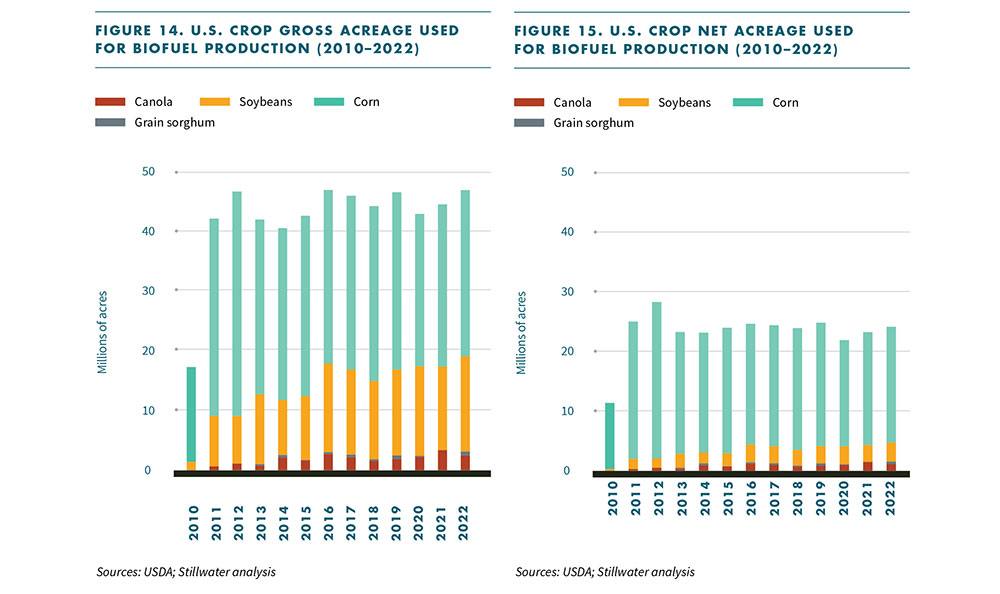
- Impact on Food Supply and Prices – The study concluded that biofuels are not a leading source of high commodity prices. The most significant impact is seen at the commodity market level, but this effect is generally modest and muted at the consumer level. Most studies suggest that the effect of biofuels on agricultural commodity prices was between 10%-30% during the expansion period. In the long term, biofuels increased corn prices by an average of 14% but the impact on final consumer prices in the United States was estimated to be only around 1%.In addition, the study found that the increase in the prices of beef, milk, pork, and poultry per billion-gallon increase in corn ethanol was generally small, around 1% or less. This was largely due to the fact that biofuels production, particularly corn ethanol, generates large volumes of co-products that are returned to the animal feed market, effectively mitigating the direct impact of crop diversion on feed availability. The study found that without the ethanol by-product known as Dried Distillers Grains with Solubles (DDGS), a high-protein feed for livestock, the U.S. would have to harvest 15 million additional acres of soybeans and 5 million additional acres of corn.
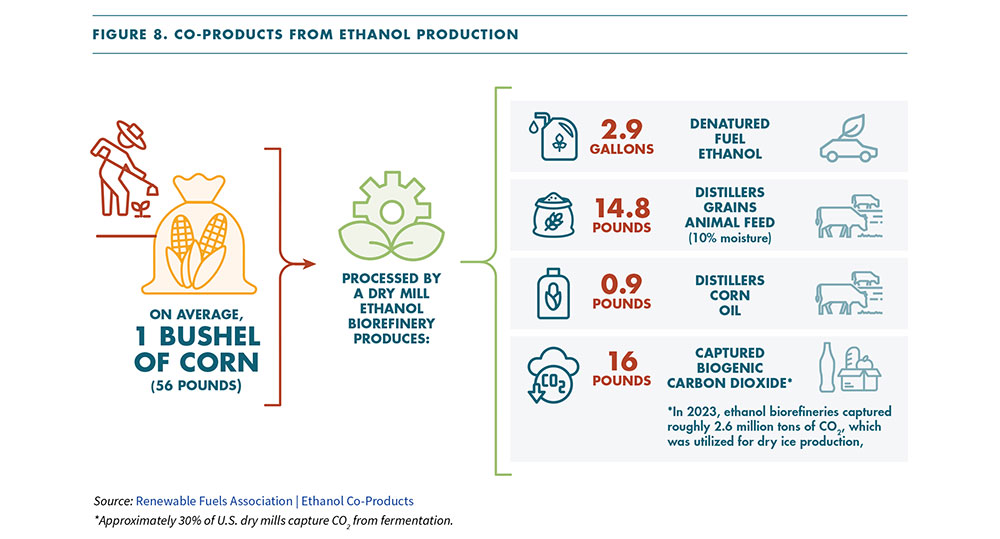
Conclusion
TEI is focused on supporting the market to discover ways to reduce emissions while preserving access to reliable and affordable transportation energy for all consumers. This has led us to do several projects that look closely at the role of biofuels in the market and the impact that role could have on other parts of the economy. We have found that biofuels are essential if we hope to reduce emissions effectively, especially in the near term. They provide a lower carbon option, are scalable and deliver economic value beyond their emissions benefits. In addition, biofuels can be used in 1.5 billion vehicles throughout the world today as opposed to waiting for those vehicles to be replaced with a lower emissions technology.
Despite the benefits associated with biofuels, I am first to admit that they are not perfect, they have limitations and they come with trade-offs – but that is true about every option. For example, I am a big fan of electric vehicles, but they are not zero emissions, they have many limitations and building the infrastructure to support them and provide them with electricity will be very expensive and challenging. But that does not mean they won’t be an important part of the transportation sector going forward, because they will be and they should be.
Everything comes with compromises, which is why TEI takes a broad look at the overall impact of the options available to the market and leverages the perspective of diverse interests so we hopefully can help avoid unintended consequences and maximize the value of market investments. If we only focus on the negatives, we will never achieve our objectives. We need a portfolio of options and we should be supportive of those that are viable today and those that show promise for tomorrow. READ MORE
Related articles
- ADM shares fall after ADM lowers its profit forecast for 2025 due to biofuel and trade uncertainties (Reuters/World Energy News)
Excerpt from Reuters/World Energy News: Grains trader Archer-Daniels-Midland cut its 2025 profit forecast for a third straight quarter on Tuesday as U.S. biofuel policy uncertainty and global trade disruptions pressured oilseed crush margins.
The shares were down about 1 percent at midday after falling nearly 11 percent in premarket trading.
ADM's earnings and those of its peers in the agribusiness sector have been eroded over recent quarters as a result of abundant global crop supplies, and a volatile commodities market that has weakened margins.
The U.S. President Donald Trump’s tariff threats and shifting of deadlines for duties has created further difficulty for global grains merchants, like ADM. This includes halting Chinese purchase of U.S. soya beans and other farm products that have driven crop prices to multiyear lows.
Deferring U.S. policy decisions on biofuels, especially regarding requirements for renewable fuel blends, has slowed the use of feedstocks such as soybean oil produced by ADM processing facilities.
...
The company expects a return to profitability in 2026.
The CEO Juan Luciano stated that "the recent progress in the deal with China, coupled with our expectations of gaining clarity on U.S. policy regarding biofuels within the next few weeks or months will be an encouraging setup for the coming year." READ MORE
Nearly 55,000 articles in our online library!
Use the categories and tags listed below to access the nearly 50,000 articles indexed on this website.
Advanced Biofuels USA Policy Statements and Handouts!
- For Kids: Carbon Cycle Puzzle Page
- Why Ethanol? Why E85?
- Just A Minute 3-5 Minute Educational Videos
- 30/30 Online Presentations
- “Disappearing” Carbon Tax for Non-Renewable Fuels
- What’s the Difference between Biodiesel and Renewable (Green) Diesel? 2020 revision
- How to De-Fossilize Your Fleet: Suggestions for Fleet Managers Working on Sustainability Programs
- New Engine Technologies Could Produce Similar Mileage for All Ethanol Fuel Mixtures
- Action Plan for a Sustainable Advanced Biofuel Economy
- The Interaction of the Clean Air Act, California’s CAA Waiver, Corporate Average Fuel Economy Standards, Renewable Fuel Standards and California’s Low Carbon Fuel Standard
- Latest Data on Fuel Mileage and GHG Benefits of E30
- What Can I Do?
Donate
DonateARCHIVES
- February 2026
- January 2026
- December 2025
- November 2025
- October 2025
- September 2025
- August 2025
- July 2025
- June 2025
- May 2025
- April 2025
- March 2025
- February 2025
- January 2025
- December 2024
- November 2024
- October 2024
- September 2024
- August 2024
- July 2024
- June 2024
- May 2024
- April 2024
- March 2024
- February 2024
- January 2024
- December 2023
- November 2023
- October 2023
- September 2023
- August 2023
- July 2023
- June 2023
- May 2023
- April 2023
- March 2023
- February 2023
- January 2023
- December 2022
- November 2022
- October 2022
- September 2022
- August 2022
- July 2022
- June 2022
- May 2022
- April 2022
- March 2022
- February 2022
- January 2022
- December 2021
- November 2021
- October 2021
- September 2021
- August 2021
- July 2021
- June 2021
- May 2021
- April 2021
- March 2021
- February 2021
- January 2021
- December 2020
- November 2020
- October 2020
- September 2020
- August 2020
- July 2020
- June 2020
- May 2020
- April 2020
- March 2020
- February 2020
- January 2020
- December 2019
- November 2019
- October 2019
- September 2019
- August 2019
- July 2019
- June 2019
- May 2019
- April 2019
- March 2019
- February 2019
- January 2019
- December 2018
- November 2018
- October 2018
- September 2018
- August 2018
- July 2018
- June 2018
- May 2018
- April 2018
- March 2018
- February 2018
- January 2018
- December 2017
- November 2017
- October 2017
- September 2017
- August 2017
- July 2017
- June 2017
- May 2017
- April 2017
- March 2017
- February 2017
- January 2017
- December 2016
- November 2016
- October 2016
- September 2016
- August 2016
- July 2016
- June 2016
- May 2016
- April 2016
- March 2016
- February 2016
- January 2016
- December 2015
- November 2015
- October 2015
- September 2015
- August 2015
- July 2015
- June 2015
- May 2015
- April 2015
- March 2015
- February 2015
- January 2015
- December 2014
- November 2014
- October 2014
- September 2014
- August 2014
- July 2014
- June 2014
- May 2014
- April 2014
- March 2014
- February 2014
- January 2014
- December 2013
- November 2013
- October 2013
- September 2013
- August 2013
- July 2013
- June 2013
- May 2013
- April 2013
- March 2013
- February 2013
- January 2013
- December 2012
- November 2012
- October 2012
- September 2012
- August 2012
- July 2012
- June 2012
- May 2012
- April 2012
- March 2012
- February 2012
- January 2012
- December 2011
- November 2011
- October 2011
- September 2011
- August 2011
- July 2011
- June 2011
- May 2011
- April 2011
- March 2011
- February 2011
- January 2011
- December 2010
- November 2010
- October 2010
- September 2010
- August 2010
- July 2010
- June 2010
- May 2010
- April 2010
- March 2010
- February 2010
- January 2010
- December 2009
- November 2009
- October 2009
- September 2009
- August 2009
- July 2009
- June 2009
- May 2009
- April 2009
- March 2009
- February 2009
- January 2009
- December 2008
- November 2008
- October 2008
- September 2008
- August 2008
- July 2008
- June 2008
- May 2008
- April 2008
- March 2008
- February 2008
- January 2008
- December 2007
- November 2007
- October 2007
- September 2007
- August 2007
- June 2007
- February 2007
- January 2007
- October 2006
- April 2006
- January 2006
- April 2005
- December 2004
- November 2004
- December 1987
CATEGORIES
- About Us
- Advanced Biofuels Call to Action
- Aviation Fuel/Sustainable Aviation Fuel (SAF)
- BioChemicals/Renewable Chemicals
- BioRefineries/Renewable Fuel Production
- Business News/Analysis
- Cooking Fuel
- Education
- 30/30 Online Presentations
- Competitions, Contests
- Earth Day 2021
- Earth Day 2022
- Earth Day 2023
- Earth Day 2024
- Earth Day 2025
- Executive Training
- Featured Study Programs
- Instagram TikTok Short Videos
- Internships
- Just a Minute
- K-12 Activities
- Mechanics training
- Online Courses
- Podcasts
- Scholarships/Fellowships
- Teacher Resources
- Technical Training
- Technician Training
- University/College Programs
- Events
- Coming Events
- Completed Events
- More Coming Events
- Requests for Speakers, Presentations, Posters
- Requests for Speakers, Presentations, Posters Completed
- Webinars/Online
- Webinars/Online Completed; often available on-demand
- Federal Agency/Executive Branch
- Agency for International Development (USAID)
- Agriculture (USDA)
- Commerce Department
- Commodity Futures Trading Commission
- Congressional Budget Office
- Defense (DOD)
- Air Force
- Army
- DARPA (Defense Advance Research Projects Agency)
- Defense Logistics Agency
- Marines
- Navy
- Education Department
- Energy (DOE)
- Environmental Protection Agency
- Federal Energy Regulatory Commission (FERC)
- Federal Reserve System
- Federal Trade Commission
- Food and Drug Administration
- General Services Administration
- Government Accountability Office (GAO)
- Health and Human Services (HHS)
- Homeland Security
- Housing and Urban Development (HUD)
- Interior Department
- International Trade Commission
- Joint Office of Energy and Transportation
- Justice (DOJ)
- Labor Department
- National Academies of Sciences Engineering Medicine
- National Aeronautics and Space Administration
- National Oceanic and Atmospheric Administration
- National Research Council
- National Science Foundation
- National Transportation Safety Board (NTSB)
- Occupational Safety and Health Administration
- Overseas Private Investment Corporation
- Patent and Trademark Office
- Securities and Exchange Commission
- State Department
- Surface Transportation Board
- Transportation (DOT)
- Federal Aviation Administration
- National Highway Traffic Safety Administration (NHTSA)
- Pipeline and Hazardous Materials Safety Admin (PHMSA)
- Treasury Department
- U.S. Trade Representative (USTR)
- White House
- Federal Legislation
- Federal Litigation
- Federal Regulation
- Feedstocks
- Agriculture/Food Processing Residues nonfield crop
- Alcohol/Ethanol/Isobutanol
- Algae/Other Aquatic Organisms/Seaweed
- Atmosphere
- Carbon Dioxide (CO2)
- Field/Orchard/Plantation Crops/Residues
- Forestry/Wood/Residues/Waste
- hydrogen
- Manure
- Methane/Biogas
- methanol/bio-/renewable methanol
- Not Agriculture
- RFNBO (Renewable Fuels of Non-Biological Origin)
- Seawater
- Sugars
- water
- Funding/Financing/Investing
- grants
- Green Jobs
- Green Racing
- Health Concerns/Benefits
- Heating Oil/Fuel
- History of Advanced Biofuels
- Infrastructure
- Aggregation
- Biofuels Engine Design
- Biorefinery/Fuel Production Infrastructure
- Carbon Capture/Storage/Use
- certification
- Deliver Dispense
- Farming/Growing
- Precursors/Biointermediates
- Preprocessing
- Pretreatment
- Terminals Transport Pipelines
- International
- Abu Dhabi
- Afghanistan
- Africa
- Albania
- Algeria
- Angola
- Antarctica
- Arctic
- Argentina
- Armenia
- Aruba
- Asia
- Asia Pacific
- Australia
- Austria
- Azerbaijan
- Bahamas
- Bahrain
- Bangladesh
- Barbados
- Belarus
- Belgium
- Belize
- Benin
- Bermuda
- Bhutan
- Bolivia
- Bosnia and Herzegovina
- Botswana
- Brazil
- Brunei
- Bulgaria
- Burkina Faso
- Burundi
- Cambodia
- Cameroon
- Canada
- Canary Islands
- Caribbean
- Central African Republic
- Central America
- Chad
- Chile
- China
- Colombia
- Congo
- Congo, Democratic Republic of
- Costa Rica
- Croatia
- Cuba
- Cyprus
- Czech Republic
- Denmark
- Dominican Republic
- Dubai
- Ecuador
- Egypt
- El Salvador
- Equatorial Guinea
- Estonia
- Eswatini/Swaziland
- Ethiopia
- European Union (EU)
- Fiji
- Finland
- France
- French Guiana
- Gabon
- Georgia
- Germany
- Ghana
- Global South
- Greece
- Greenland
- Grenada
- Guatemala
- Guinea
- Guyana
- Haiti
- Honduras
- Hong Kong
- Hungary
- Iceland
- India
- Indonesia
- Iran
- Iraq
- Ireland
- Israel
- Italy
- Ivory Coast
- Jamaica
- Japan
- Jersey
- Jordan
- Kazakhstan
- Kenya
- Korea
- Kosovo
- Kuwait
- Laos
- Latin America
- Latvia
- Lebanon
- Liberia
- Lithuania
- Luxembourg
- Macedonia
- Madagascar
- Malawi
- Malaysia
- Maldives
- Mali
- Malta
- Marshall Islands
- Mauritania
- Mauritius
- Mexico
- Middle East
- Moldova
- Monaco
- Mongolia
- Morocco
- Mozambique
- Myanmar/Burma
- Namibia
- Nepal
- Netherlands
- New Guinea
- New Zealand
- Nicaragua
- Niger
- Nigeria
- North Africa
- North America
- North Korea
- Northern Ireland
- Norway
- Oman
- Pakistan
- Panama
- Papua New Guinea
- Paraguay
- Peru
- Philippines
- Poland
- Portugal
- Qatar
- Republic of
- Romania
- Russia
- Rwanda
- Saudi Arabia
- Scotland
- Senegal
- Serbia
- Sierra Leone
- Singapore
- Slovakia/Slovak Republic
- Slovenia
- Solomon Islands
- South Africa
- South America
- South Korea (Republic of Korea)
- South Sudan
- Southeast Asia
- Spain
- Sri Lanka
- Sudan
- Suriname
- Sweden
- Switzerland
- Taiwan
- Tanzania
- Thailand
- Timor-Leste
- Togo
- Trinidad and Tobago
- Tunisia
- Turkey
- Uganda
- UK (United Kingdom)
- Ukraine
- United Arab Emirates UAE
- Uruguay
- Uzbekistan
- Vatican
- Venezuela
- Vietnam
- Wales
- Zambia
- Zanzibar
- Zimbabwe
- Marine/Boat Bio and Renewable Fuel/MGO/MDO/SMF
- Marketing/Market Forces and Sales
- Opinions
- Organizations
- Original Writing, Opinions Advanced Biofuels USA
- Policy
- Presentations
- Biofuels Digest Conferences
- DOE Conferences
- Bioeconomy 2017
- Bioenergy2015
- Biomass2008
- Biomass2009
- Biomass2010
- Biomass2011
- Biomass2012
- Biomass2013
- Biomass2014
- DOE Project Peer Review
- Other Conferences/Events
- R & D Focus
- Carbon Capture/Storage/Use
- Co-Products
- Feedstock
- Logistics
- Performance
- Process
- Vehicle/Engine/Motor/Aircraft/Boiler/Ship
- Yeast
- Railroad/Train/Locomotive Fuel
- Resources
- Books Web Sites etc
- Business
- Definition of Advanced Biofuels
- Find Stuff
- Government Resources
- Scientific Resources
- Technical Resources
- Tools/Decision-Making
- Rocket/Missile Fuel
- Sponsors
- States
- Alabama
- Alaska
- Arizona
- Arkansas
- California
- Colorado
- Connecticut
- Delaware
- Florida
- Georgia
- Hawai'i
- Idaho
- Illinois
- Indiana
- Iowa
- Kansas
- Kentucky
- Louisiana
- Maine
- Maryland
- Massachusetts
- Michigan
- Midwest
- Minnesota
- Mississippi
- Missouri
- Montana
- Native American tribal nation lands
- Nebraska
- Nevada
- New Hampshire
- New Jersey
- New Mexico
- New York
- North Carolina
- North Dakota
- Ohio
- Oklahoma
- Oregon
- Pennsylvania
- Puerto Rico
- Rhode Island
- South Carolina
- South Dakota
- Tennessee
- Texas
- Utah
- Vermont
- Virginia
- Washington
- Washington DC
- West Coast
- West Virginia
- Wisconsin
- Wyoming
- Sustainability
- Uncategorized
- What You Can Do
tags
© 2008-2023 Copyright Advanced BioFuels USA. All Rights reserved.
.jpg)





Comments are closed.